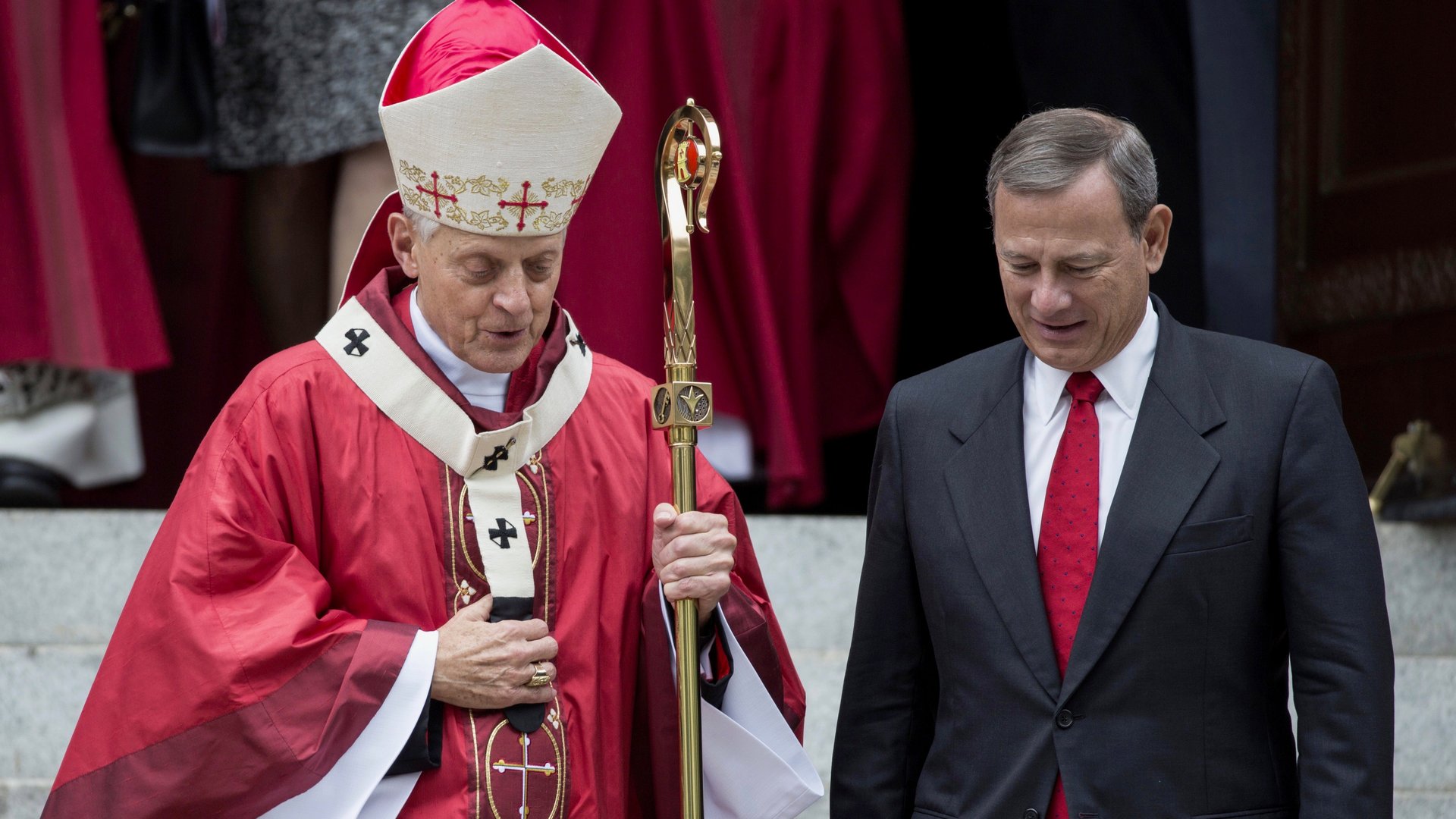Supreme Court nominee Brett Kavanaugh is religious—just like all the sitting justices
There are no atheists in foxholes—or on the US Supreme Court. Although separation of church and state is a critical principle in American law, the nation’s most powerful justices all identify as religious. Donald Trump’s new pick for junior associate justice, Brett Kavanaugh, is no exception.


There are no atheists in foxholes—or on the US Supreme Court. Although separation of church and state is a critical principle in American law, the nation’s most powerful justices all identify as religious. Donald Trump’s new pick for junior associate justice, Brett Kavanaugh, is no exception.
In fact, Kavanaugh put his faith front and center while accepting the nomination on July 9. ”I am a Catholic,” he told the audience in the White House East Room, explaining that he’s active in the Washington, DC, Catholic community and engaged in church volunteer work like feeding the homeless. Kavanaugh professes to follow the creed “Men for others,” which is the motto of his Jesuit high school, Georgetown Preparatory School.
If appointed, Kavanaugh will be part of a Catholic majority on the court. The bench’s Catholic contingent includes chief justice John Roberts as well as justices Clarence Thomas, Samuel Alito, and Sonia Sotomayor. Anthony Kennedy, whom Kavanaugh would be replacing, is also Catholic, while Neil Gorsuch was raised as Catholic but most recently attended a progressive Episcopalian church in Denver, Colorado.
Meanwhile, justices Ruth Bader Ginsburg, Stephen Breyer, and Elena Kagan are all Jewish. Last week Ginsburg was in Israel to accept a Genesis Prize—dubbed “the Jewish Nobel Prize”—for lifetime achievement and “groundbreaking legal work in the field of civil liberties and women’s rights.” At a ceremony in Tel Aviv, she cited the Dutch diarist Anne Frank and her experience in the Holocaust as inspiration, as well as her Jewish roots generally.
“I am a judge, born raised and proud of being a Jew,” Ginsburg said, repeating a statement she’s made before. “The demand for justice, for peace, for enlightenment runs through the entirety of Jewish history and Jewish tradition. I hope that in all the years I continue to have the good fortune to serving on the bench of the Supreme Court of the United States I will have the strength and courage to remain steadfast in service of that demand.”
Religious history
This religious makeup is a striking departure from most of the court’s history. For the first 180 years of the Supreme Court, Protestant justices dominated. Catholics were few—the first was appointed in 1836—and there were no Jews at all until 1916, with the appointment of Louis Brandeis. Since the court’s inception in 1789, there have been 91 Protestant judges named out of 113 total justices.
The recent shift from a Protestant court to a bench with none—or maybe one, if Gorsuch counts—has been attributed to the fact that Jews and Catholics have overcome much of the discrimination those groups previously faced in the US. Still, there are still many faiths that have yet to be represented on the bench.
The public pays attention to the justices’ religions in part because they face cases about faith every term. In the past year, for example, the Supreme Court has weighed in on Trump’s ban on travel for citizens of six mostly-Muslim nations, and a baker’s faith-based decision not to create a wedding cake for a gay couple. Those decisions didn’t break down along religious lines, however. Justices Ginsburg and Sotomayor, for example, joined in dissents both times, finding the same flaws in the majority’s reasoning despite their different religions. And legal scholars haven’t found evidence that justices decide in faith-based blocs generally.
Still, there’s been much talk among political pundits that Kavanaugh will push the court in a more conservative direction, in part because he’s vocal about his Catholicism. Liberals are worried that Kavanugh’s presence on the bench could lead to decisions that erode abortion rights and even overturn Roe v. Wade altogether. Meanwhile, there’s resistance to him from the Methodist Christian activist group American Family Association, which argues that he’s insufficiently supportive of religious freedom. The faith-based far right would like a pick more committed to protecting Christians.
But the fact that Kavanaugh, or any other judge, has personal faith by no means indicates that they can’t follow the Constitution or the laws of the land. Kavanaugh won’t be deciding cases according to the Catholic canon any more than Ginsburg is writing opinions based on Jewish law, or Halacha. Moreover, as the Washington Post (paywall) points out, William Brennan, the justice who convinced the majority of the Supreme Court to legalize abortion in 1972, was a Catholic who personally opposed the practice.